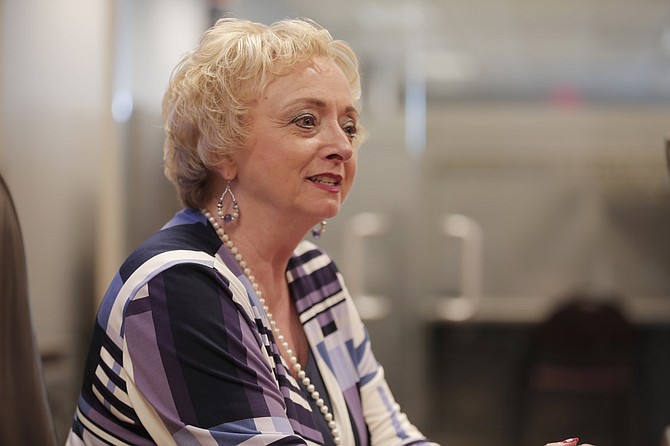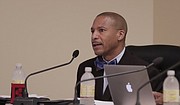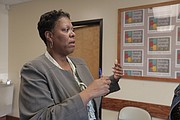Dr. Carey Wright, state superintendent of education, says education works best when you’ve got the right leadership. Photo by Imani Khayyam.
It's the end of the school year, and the Mississippi Department of Education is expecting budget cuts to everything but the state's education funding formula MAEP, even though Gov. Phil Bryant hasn't signed the appropriations bill into law, yet. Regardless, Dr. Carey Wright, state superintendent of education, says the Mississippi Department of Education is busy; it's state assessment time. She hasn't even had time to listen to "Lemonade," yet, although she says she's a big Beyonce fan.
Mississippi education keeps Wright occupied. While the Mississippi Legislature was in session this year, Wright collaborated with former Colorado Lt. Gov. Barbara O'Brien, and nationally renowned education specialist and researcher Hedy Chang in order to present at the Capitol on chronic absenteeism and about the effects of poverty on early-childhood literacy.
In a Senate Education Committee meeting, when Sen. David Blount, D-Jackson, asked her why the Literacy-Based Promotion Act passed reading-deficient students to the fourth grade even if they tested at the lowest proficiency level, Wright immediately and firmly responded that it was due to the state's legislation that the bar was set so low; the Mississippi Legislature had set it there themselves.
But Wright's goal as state superintendent is to raise education standards, not just in third-grade literacy. Born and raised in New Mexico, she received her bachelor's, master's and doctoral degrees at the University of Maryland. As an educator, Wright has taught in a school district as it launched a controversial desegregation program. Wright used her passion for education to help transform the public-school district in Washington, D.C., where she was deputy chief academic officer when she left in 2013. Now, having served as Mississippi's state superintendent for the past two years, she's excited for the future of education in the state.
She's worked in extremely high achieving districts and those that struggled. The experience of working in two districts that invested in a variety of rigorous programs for students convinced her all students deserve the "leg up" afforded by special after-school programs and advanced coursework.
Wright lives in Madison County. She has two grown daughters and a grand-dog. She recently sat down with the Jackson Free Press to talk about education legislation, school funding and charter schools.
How do you like Mississippi?
It's home now. I love the people. I love my job. I love what I do. I love the challenge of the job. I've got a great team to work with. Everybody comes to the table with the same sense of urgency for the children of this state, and I can't really ask for more than that.
How are challenges you face here different or the same as the ones in D.C.?
D.C. suffers from the same level of poverty that Mississippi does. In that, it's very similar. And even though you're talking about an urban district versus a pretty rural state, some of the things are very similar. Some of the children have never been out of D.C., like some children here have never been out of Mississippi. Their experiences are limited in that way. Student achievement was a struggle, and it continues to be not only for DC, but also for Mississippi.
You're dealing with children, regardless of where that is, and wanting all kids to be able to read and do well in school so that they can be successful in life whether that's work, or a career, or college. It's those kinds of things that I think are very similar. Before I went to D.C., I was in two very high-performing districts. So you see what's possible when everybody is really working toward the same things. For me that same vision of having the best of what's possible for Mississippi is a good one for me to have, because our children are just as capable as anybody else of doing wonderful things, so we need to make sure they have the opportunities to do that.
If you had $10 billion for Mississippi education, what would be the first thing you'd spend money on?
A good chunk of it, if not all of it, would go into early childhood education, I can tell you that. I think that we are only right now investing $3 million, and other states are far, far ahead of us in terms of their investment. And I think with the little ones in poverty, if you get them in a high-quality early-childhood program and a language-rich environment with all the reading materials and all the ways we teach children to socialize and cooperate and problem solve, I think that our state would be so much further ahead if our children really had a quality four-year-old program. That would probably be one of the first things.
If there's any money leftover—(laughs)—I would invest in more rigorous coursework for our high-school students. I think that whether it's dual credit, dual enrollment, or an IB or AP program, our children need that opportunity. When you get to college, it's the wake-up time for a lot of kids that kind of got out of high school thinking "I can do this," and then all of a sudden, you're on your own if you haven't had that level of rigor or challenge in your thinking or what it means to put together an entire report from beginning to end and do some research and a lot of writing. I think that's something I would afford for all our students, not just high school.
What about after school?
Both the districts I worked in in Maryland and in D.C. had a lot of programming, and I think that's an invaluable part that a lot of children can really benefit from. And not a babysitting service but a time they can get engaged whether it's a homework follow-up or it's tutoring—a lot of communities offer that. It'd be an opportunity for our high-school students to get involved with not only tutoring but also with mentoring children who are smaller.
I think that that extended day—there's a lot of research out there that says if we could extend the daytime or we could extend the year for some children then that would benefit them versus them having the two months off when they have so much of the summer to slide. And benefit them not only in academics but also in (personal) enrichment. Part of your day might be focused on academics, but the other part could be on learning to swim or learning to play tennis.
What is the most far-reaching concern you as state superintendent have?
Probably I would say that I don't think we expect enough of our children. I think the moment you set out with doubt, children will sense that. But if you set high expectations for children and provide this support that they need, children can do just about anything you tell them that they can do.
I think they really need to believe that someone believes in them. It helps them along the way, so it's not just throwing them off into the deep end of the pool- it's helping them figure out how to get there. I think that holds a lot of children back, because we just don't expect enough of our children.
What legislation are you proud of?
They bumped up the proficiency piece of the Literacy-Based Promotion Act. Starting in the 2018-2019 academic years they're going to score (tests) above the two lower achievement levels, which is a much higher bar than they currently have right now. I'm hopeful that the legislation around the achievement school district will provide an opportunity for us to do some really wonderful things for children in the state. I was pleased with that.
I was pleased that they also changed another part of the legislation in the Literacy-Based Promotion Act that gives children a bigger opportunity to meet that good-cause exemption if you're a child with a disability. It formerly had read that you had to have had two years of intensive reading instruction and have been retained, and to me that was a little bit of a perverse incentive. So they changed the word to "or" so I can have two years of reading instruction, or have been retained for good cause exemption. I think that gives a little more leeway for teachers.
Considering the financial condition of JPS and the City of Jackson, how do you think the growth of charters will affect that district?
Well, the charter schools can open up anywhere. The way the original legislation was, it brings more of an eye to where you've got more children. So, JPS being a large district, that's when a charter company will come in. They're looking for where can they grab a lot of kids. So I'm thinking that's where JPS landed with the first two and the third that will open in the fall.
But I think that the charter authorizer board I serve on puts these charters through a very rigorous process. It's not "apply, and you're automatically in." We require them to really come in with a strong financial plan, a strong board that's going to support and oversee them, and then there's a lot of criteria they've got to meet that a lot of other schools are going to meet. They've got to take the same assessments, their children are held to the same level of rigor. We're allowed by law to approve up to 15 a year, but you can see how selective we've been that we only have two, and we'll have three next year. Now the next round of applications is open, so we'll see what that brings us.
With the question of funding, how will that continue to impact that district?
Part of what happened with JPS—part of your funding from the MAEP moneys that are given out is based on a level of average daily attendance. When your average daily attendance drops, if you're averaging $5,000 a student, well, JPS' ADA dropped significantly. So when that dropped, meaning they lost about 1,000 children in their ADA, well that's $5 million right there. The charter schools only own about 200 of those children, so it's important when you start tracking attendance that you grab these kids early that are starting to either drop out or not coming to school for whatever reason so you can be proactive about that.
So there are two parts to that: I think that that's going to be important to JPS moving forward. The money that follows the child is the same proportion of MAEP money that all other districts get as well, because they become their own district, if you will. So I think that it'll be interesting to see now that the (charter school) law has changed somewhat if charter authorizers are still going to want to go to JPS, or if they'll want to go to other areas of the state, because it's opened it up a little bit for them.
What do you think will help Mississippi the best? Is the answer charter schools?
To me, I think charters are an answer for some children. It's usually a smaller environment; usually it's a little bit more focused around a particular theme and innovation that they want to do. But I don't think charter schools are going to take over Mississippi, nor do I think they're the answer for everything around education.
I'm a very strong public-education advocate so I think for us we need to do the best that we can to make public education in Mississippi the best it can be because I think our state's economy depends on it, our children's future depends on it. So the question is, how do we look at the schools and teachers and principals that we have, and how do we build their capacity to build a stronger program for children?
As lead teacher of the teachers, is there a future that you're hoping different for Mississippi teachers as well?
Having been a teacher as well, I have a real affinity for teachers. That's where the rubber meets the road. That's where all the magic happens. For me, I want our teachers to feel that they're supported. I want them to feel that they've got an adequate amount of resources in order to meet children's needs. I want them to be able to experience leadership positions that don't require them to leave the classroom. A lot of teachers want leadership positions and experiences but don't want to leave the classroom. There's a variety of ways you can do that.
So for me, it's whatever opportunities we can provide them so they can feel on top of their game at any given time.
If you could rank the MAEP formula, how strong do you think it is?
I think it was built originally around what we call a C district and "adequate" was defined as whatever a C district was spending. There's a lot of rules and regulations inside this formula, so it's hard to say that. I think what the :egislature is trying to do and what I think they'll probably do during this upcoming year is take the time to see what other states are doing and how they're funding education. Other states are dealing with poverty and rural parts like we are, but there are other ways to fund education. I think for us it's stepping back and saying, we did this and it's gotten us this far, do we need to look at something differently to move us ahead? I expect them to look around the nation and see what's going on.
What are your ideas for Mississippi education?
Education costs money. There's no two ways about it. How much does education cost? That's going to vary from state to state depending on what the economy is like but to put in inventive or innovative kinds of programs or expand our CTE (Career and Technical Education) or expand computer science or things of that nature, it's going to require some funding. What does that level of funding looks like? I think you've got to take an equity piece into it as well, because I think some districts have the ability to raise a lot more local money than other districts. You've got to figure out a way that's going to be compensative for some of that. If I can only raise 5 dollars, that's all I can raise, but if I happen to be in a place that can give me an additional ten, I can do more with 15 than I can with five. So I think that's what we've got to be looking at—how can we level the playing field around the state for all the children.
What inspired your love for education?
Desegregation occurred in the district I was working in as a teacher. Mid-year, we lost half of our school, and we gained another half of our school, and the half of the school that we gained were African American children who had never gone to school with white children ever. There was no preparation for the teachers. We literally closed school on a Wednesday, were off on Thursday, and on Friday, in come these kids, and out go these kids on buses.
I think the realization for me—I was teaching fifth grade at the time—was looking at all of these little faces that were two and three years below grade level, and they were in fifth grade. I thought, "This is just a travesty." It was no fault of these children. What's it going to take to ensure that these children are going to be successful? These kids are competing against kids who have had that kind of an education. To catch up in fifth grade, you can do it, but it takes you a lot longer to get there. As I worked through being a teacher, and I seemed to have a passion for children who needed me the most, those kids who weren't reading well or had behavior problems, I usually ended up with them in my classroom because teachers would say, "Give them to Carey Wright."
As I became a principal, it was again: What are we doing for those kids who need us the most? I always say that there are children who learn because of you and children who learn in spite of you.
It's not that you don't challenge the kids that are above because you've got to continue challenging them. There should never be a ceiling for any child, but the little ones who need the most help to get to even level, that's really where my focus started to be on kids.
What impact do you think consolidation is going to have on schools in the Delta?
It's not so much the consolidation as it is creating a school of a size where you can provide adequate programming. I've been a principal of a school larger than some of our districts, so that kind of puts it into perspective for you. The idea behind consolidation is you get more of an economy of scale with regards to programming. You can provide a lot more when you have larger numbers of kids together. It's tough when you have tiny little districts and even tinier little schools within them to really provide a strong program.
Is it a one-size-fits-all?
You're going to have to look at it district by district, area of state by area of state, because another thing you don't want to have happen is to have schools so far apart there's no way to consolidate. I think every consolidation has to be looked at by where geographically you're trying to do that.
I do think I expect the Legislature to come back this coming year with more bills around consolidation.
When does education work best?
When you've got the right leadership. Leadership starts at the top. You've got to have a principal that is passionate about what he or she does and focuses on children and then believes in teachers, supports them and makes sure they've got the professional development and resources that they need and they're feeling like the capacity is being built and delivered to children. When everybody is focused on everything in the best interests of children.
Sometimes adults get in the way because they want to focus more on adults than on children. We have to keep the focus on what's most important in the building, and that is the children we educate every day, and having a sense of urgency about it. Today is the only day they've got, so if you don't make today the best it can be, when tomorrow comes, you've lost that day for that child. What is it we can do now that's the best we can make it on Wednesday, because when Wednesday ends and the kids walk out the door, they can't get Wednesday back. The focus has to be them every single day. Parents are entrusting their children to us. We've got to earn that trust.
Sierra Mannie is an education reporting fellow for the Jackson Free Press and The Hechinger Report. Email her at sierra@jacksonfreepress.com. This story has been edited for length and clarity.
ABOUT DR. CAREY WRIGHT
Carey Marlene Wright, Ed.D., state superintendent of education
Education: B.S. Elementary Education, University of Maryland, College Park, 1972; M.S. Administration, Supervision and Curriculum, University of Maryland, College Park, 1976; Ed.D. Education Policy and Planning, University of Maryland, College Park, 1994
Family: Two daughters, one son-in-law, granddog
More like this story
More stories by this author
- Minding the Equity Gap: How Majority-Black Clinton District Earns Its ‘A’ Rating
- Beyond Blame: JPS Works to Avoid State Takeover of Local Schools
- Facing Takeover, JPS Corrective Action Gains Urgency
- Licensing Mississippi’s Teachers: A Shift in Control?
- Takeover of JPS Looms as District Addresses Probation, Audit






Comments
Use the comment form below to begin a discussion about this content.